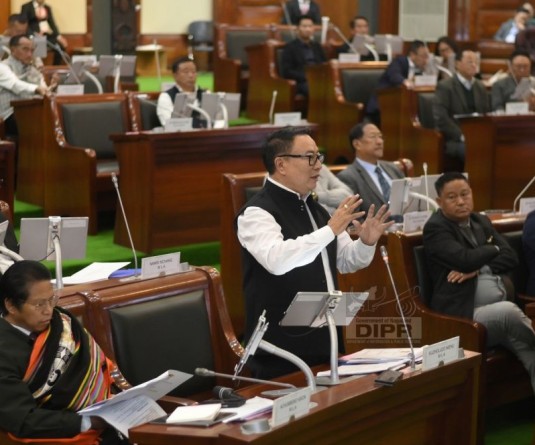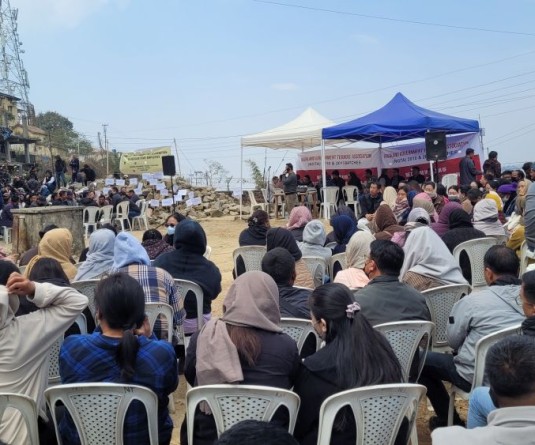
Chizokho Vero
Kohima | May 10
The Village Vision Cell (VVC) Chiechama has put focus on the construction of Agri link roads, drinking water, and power connections to households in the village. It also encouraged the villagers to undertake bamboo plantations. Integrated farming, conservation of flora and fauna also figured in its priority list. Introduction of vocational courses (Hair cutting and cobbler) led to establishment of a Hair Cutting Salon by the youth in the village.
Cooking classes were also initiated for women. It also set July 30 as “Beatification Day” to be held every year. Solar streetlights were installed in the village circular road. Two marketing sheds were constructed for SHGs to sell their produces. Restriction on hunting and ban on sale of intoxicated things within the village also came into force.
Jotsoma, VVC in its action plan cited the ongoing schemes and the ones to be taken up during 2011-2015. It included nature conservation and ecotourism, setting up of 6 study centres in the village for students at the primary level, conversion of existing children’s library at Ketsaki, avenue for setting up a community information centre along with a library, vocational education and training programme for rural youth/women and educated unemployed, construction of a public (pay and use) toilet at Phezhu junction Jotsoma, replacement of light bulbs in all the households with CFL to ensure energy conservation and setting up the Jotsoma Village water supply project.
The concept note of the VVC made it clear that VDB is a statutory body and undertakes more physical developmental works involving the public like khels, women, youth, students etc; whereas VVC is confined to a limited group of individuals who are intellectuals and have the potential to contribute either in ideas, experiences or finance. The cell does not interfere in village administration, normal financial operations of the VDB, law and order problem unless its opinion is sought.
The VVC acts as a facilitator to coordinate and assist the process of policy formulation and implementation. It also tries to link villages to agencies associated with funding for developmental projects.
The VVC prepares short and medium term plans for the village. It identifies the resources in consultation with VDB, advices on the mode of implementation of various schemes and provides a forum for bringing all stakeholders to a common platform. The VVC comprising of well experienced, educated persons act as an information and knowledge centre and as the motivational forum for the younger generation. It also prepares project proposals in consultation with the VDB and can submit it to DPDB for its recommendations as well as approval for funding and implementation.
In its operations, the VVC facilitates the use of available physical resources judiciously for sustainable development. It can be done through a formal institutional arrangement with the VDB as well as other planning bodies of the government or locally available resources.
The other dimension is to sensitize or to educate the villager in the areas of sanitation, health care, career counselling, social service etc through seminars/ workshop as well as through interactive programmes. It also aims to coordinate with bankers for maintenance of micro finance and promote Self Help Groups in the village, the concept note stated.
The DPDB entrusted with the task of District Level Planning and Execution is given the task of making preparatory ground for the formation of VVC under its jurisdiction. The formation of VVC will pave the way for the socio economic development of the rural people with the use of expertise and experience of noted politician, bureaucrats and professionals as well as other individuals who hail from the village, added the concept note.
The cell can also as a vigilance body in checking the in-flow of the fund and monitor whether the funds percolate down to the grass root levels as designed. “In order to strengthen the rural economy, it is necessity to involve the intellectual folks of the village in the process of planning and implementation of various projects,” the concept note stated.
It said that the need of the hour is to develop a formal institutional arrangement for blending the available physical resources and intellectual resources at a grass root level for holistic development. “Villages are the veins and arteries of state. The development of the state cannot be conceived without developing villages.”
“We all hail from various villages and continue to work in different capacities or adopt different professions such as teaching, business, entrepreneurship, administration etc. The primary task is to identify the individual of the village which are in different profession or are engaged in self employment and which can contribute to develop an action plan or to have a vision for the socio economic growth of the village,” it said.
With this, the Village Vision Cell has been conceived to supplement the activities of VDB and other agencies, both governmental and nongovernmental to facilitate the promotion of developmental activities at the village level. The VVC will be advisory in nature and will assist agencies associated with developmental activities to accelerate the growth process.
VVC is a non-governmental voluntary body. The members comprise of the elected legislative member, noted bureaucrats, retired and present gazetted officers, prosperous businessmen as well as noted social workers belonging to the village.
Since DPDB Kohima is the planning and development agency of the “first district of the state,” it planned to continue the visionary initiatives of the earlier years and explored new areas to keep abreast with modernity. Thus, it introduced VVCs to benefit all villages with the theme “Back to the roots,” conceptualized and designed by Ketoho Luho, ADC (Planning) and Member Secretary DPDB, Kohima. It is also learnt that the DPDB will not finance the schemes but will recognize and facilitate the best model schemes in various ways.






